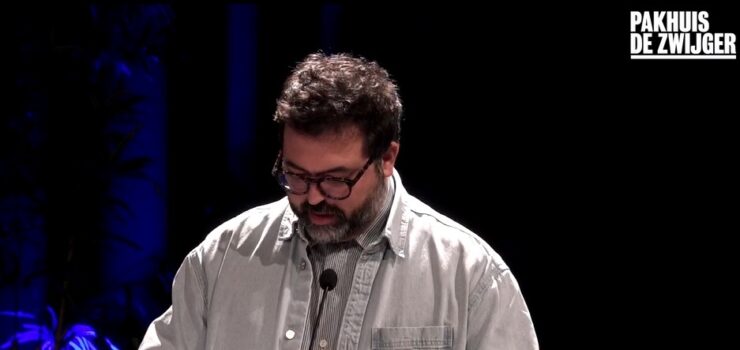Pooyan Tamimi Arab spoke about the meaning of freedom for the 21st-century revolutionaries of Iran at Pakhuis de Zwijger’s event Rising Iran (Dec. 8, Amsterdam). Other participants showed protest art and film and discussed the (international) politics of the uprising. Tamimi Arab spoke on the condition that his speech about freedom would be recorded. As of yet Pakhuis de Zwijger has not published this recording saying that they only publish fully recorded events (other speakers were not recorded). For this reason the recording has been uploaded to YouTube with Utrecht University’s Religious Studies account. A slightly edited version of the speech is published on this page.
***
Good evening everyone,
I’m glad to be here with you all in our beautiful city of Amsterdam to discuss the ongoing Iranian revolution. When I was asked whether I would participate, I offered to reflect briefly on the meaning of freedom for the Iranian people’s call to end the Islamic Republic. Upon hearing that the event would not be recorded, I asked for ten minutes of your time and asked the organizers to record what I had to say. I believe strongly that we must, here in Amsterdam, defend our liberty by speaking frankly and in public. I respect the other panelists’ decision to come here in support of the Iranian cause, but to ask not to be recorded. And yet, I also want to say that public action is what sets us free. If we allow them to grab us by the throat all the way from Tehran, here in Amsterdam, we lose our liberty.
Freedom is a subject matter that we cannot reflect on often enough; it is an ideal that democratic citizens must think about and act for if they are to protect and maintain their freedom. These days, for me, as for millions of Iranians, freedom’s meaning is bittersweet.
I think of Muhammad Maleki, a prominent defender of the cause of freedom in Iran. I think of how he endured torture in the 1980s, how each night he heard tens of fellow prisoners sing before they were taken to the gallows, how just a few years ago, this frail old man stood outside in the rain calling for freedom. “O friend, Freedom, come! How long must we wait? My life is over already… Freedom, come! It’s too late for me. I’m waiting here, until the final moment, for the freedom of the people.” Maleki did not live to see this year’s uprising, which finally caught up to his honesty: that this regime cannot be reformed, that only a revolution can save those who deserve freedom in this life―right now. But even though he did not experience these days, he knew they would come. The desire for liberty is powerful and timeless. Again and again, the call for freedom is heard. Freedom cannot be contained forever. Not even the oppressive use of state power can undo the fundamental human yearning for freedom.
But what is freedom? What does freedom mean if everyone calls for her?
The Southern States of the United States appealed to the freedom of the states in opposition to the federal government, with the aim of maintaining slavery. Hitler appealed to the freedom of the German nation to trample the Treaty of Versailles. The Communists stubbornly insisted, even under Stalin, that they were on their way to the “Kingdom of Freedom” that Marx had prophecized. And the call for freedom was part of Iran’s Islamic Revolution of 1979, too. People chanted back then: “Istiqlāl, Āzādī, Jumhūrī-i Islāmī,” Independence, Freedom, Islamic Republic. “Independence,” meaning independence from foreign powers; “Freedom,” not as a liberal concept but the freedom to be free from the authoritarian power of the Shah, the king, and his secret police; and “Islamic Republic”? The very idea of an Islamic Republic functioned to deceive a people that hardly understood what this oxymoron meant. The Iranian Nobel Peace Laureate Shirin Ebadi was recently asked what her generation lacked at that time. “‘Aql,” she said, laughing, “understanding.” Freedom without understanding, without thinking, without listening to one’s conscience, freedom without caring for others, is freedom’s undoing.
Here in Amsterdam, a statue of the philosopher Spinoza placed in front of the City Hall reminds all, to quote the Enlightenment philosopher, that “the purpose of the state is freedom.” Freedom is a fundamental concept in Spinoza’s philosophy. It ties the individual’s power to act with political freedom, and Spinoza sees a mutual dependence between these individual and political levels. A citizen can only be free in a free state, and a free state is only possible when its citizens are free.
Of course, we can also find in his books reasonings that contradict our understanding of freedom; for example, Spinoza’s thought that women do not belong in politics. But if we understand him as a representative of the Enlightenment, a time in which thoughts about freedom flourished abundantly, a charitable reading of Spinoza can still inspire men and women and even move them to act, and that in situations far beyond Western Europe.
Spinoza’s criticism of religion inspired Brazilian intellectuals in the 1960s, who resisted dictatorship and opposed religious authorities that instrumentalized superstitions to subjugate the people. And today, Spinoza is a symbol of freedom in Iran. The Tractatus Theologico Politicus was translated into Persian in 2017. It was an immediate success, the fourth print being published in 2019 in Tehran (which is rare for philosophy books). For a people that yearn for freedom and seek to escape the clutches of violent religious authorities, the ultimi barbarorum, Spinoza is an ultimate hero.
And just as in Spinoza’s thought, in the Iran of today, individual liberty is inextricably linked to the democratic freedom of all.
In her book Freedom: An Unruly History, about the history of freedom from Greek and Persian Antiquity to the French and American Revolutions, historian Annelien de Dijn defines individual freedom as the possessing of inalienable individual rights, rights that mark a private domain and that no government or ruler may infringe. De Dijn explains that this is a modern and liberal ideal. Throughout history, however, she argues, democratic freedom, the freedom of a collective to rule itself, has been of much greater importance. To be free, in this view, is to resist the enslavement of one’s people. Think of resistance against a government that is seen as illegitimate or against a foreign occupier, as in Ukraine. In the Iran of today, both freedoms, individual and collective, are fought for. Now the people chant: “Zan, Zindigī, Āzādī,” Woman, Life, Liberty. “Woman,” because women demand that the religious authorities and the state leave them alone; “Life,” in stark contrast to the revolutionary Shia cult of death, representing the desire of young and old who want to live life to the fullest, who desire joy, who want to enjoy each other, and to enjoy the world; and, “Freedom,” freedom of a people to rule itself, the freedom of individuals who do not want to be what the Ayatollahs want them to be.
Some weeks ago, I happened to meet Jonathan Israel (a historian of Spinoza, the Enlightenment, and democratic revolutions). I asked him a question about the Iranian uprising, already called a revolution. “Is it true that we are witnessing the first time in humankind’s history that an entire country calls for regime change for the sake of women’s rights?” He responded with careful enthusiasm―as if realizing something profound―saying that, indeed, he could not think of any other example. So, the Iranian women are writing an entirely new chapter, beyond Iran, in the unruly history of freedom itself. In times when authoritarian nationalism and religious fundamentalism threaten us once more, they keep our hope for freedom alive; and let us hope that our hope wins in the end.
* An earlier version of this speech was delivered at the opening of the 2022 Spinoza Day at the Amsterdam Public Library (OBA). Tamimi Arab is grateful for comments by Henri Krop and Rob Hartmans.


